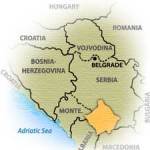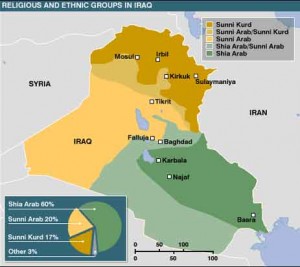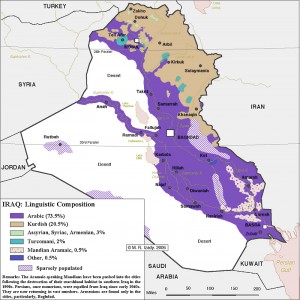Whether as a unified multi-ethnic/multi-religious republic or as a failed former federal multi-national state, Iraq has two potential futures and they are both Yugoslavia. The sooner that American and European politicians admit this reality, the sooner that sectarian warfare can be solved.
Before anything else (unless you have at least a B.A. in political science with a concentration on International Relations and/or Foreign Policy) read my blog on the Ukraine and the blog links within that posting to get some basic background on the academic knowledge you need to digest the issues: http://janbtucker.com/blog/2014/03/19/constitutional-history-of-secession-of-the-former-ussr/
Pay special attention in my blog on the history of secession in the U.S. [http://janbtucker.com/blog/2012/11/16/mythology-of-secession/] to the concept of “Romantic Nationalism.” Consider how that notion continues to plague objective efforts to analyze the collective motives of whole groups of people to achieve their aspirations and desires for self-rule. On the left side of the political spectrum one must consider how the flip-side, Romantic Internationalism, clouds the ability to engage in Political Realism. Orthodox Marxists for instance espouse essentially romantic notions about internationalism simply because Karl Marx espoused internationalism as an ideal superior to nationalism, the latter being an instrument of the capitalist class to oppress, repress, and generally f-k-over the masses. The left, which inherently believes that human nature is positive hopes that subjective differences between ethnic, national, and religious groups are just superficial and that they can live together in a multi-national state(s) harmoniously.
Now consider [http://anthroanna.com/2012/10/27/political-anthropological-approach-to-nationalism-and-national-identity/]:
There are various definitions of the relationship between the nation and nationalism. I would combine Smith (1996) who argues that “The idea of the nation…is fundamentally cultural and social” (1996:325) with Gellner (1997) who states that nationalism is a political ideology of shared cultural traits. In terms of national identity, Calhoun (1997) argues that nations “are constructed as ‘super-individuals’” (1997:125) thus “national identity assumes a special priority over other collective identities in the construction of personal identity” (ibid.). Similarly, Smith (1991) argues that national identity is the most inclusive collective identity that intersects other categories of class, gender, race, religion etc. (1991:143). However, Bringa (1995) may challenge Smith (1991) in her ethnography of Bosnia- Hercegovina where the category of Muslim became a signifier of identity when differentiating from Croat or Serb, hence the use of ethno-religious category highlights that religion does matter when the dominant hegemonic values attempt to assimilate the minority. Meadwell (1993) may argue that ethnonationalism is a form of internal colonialism, an unequal power relation between ethnic groups in one nation. This is akin to a Marxian view on nationalism, which “assumed that nationalism was the ideology used by capitalists” to maintain control (Llobera 1994:96), Marx associated nationalism with the bourgeoisie; hence he held that the common qualities of the working man were universal and should unite against capitalist nationalism (Guibernau 1997:75). However it is generally agreed that nationalism is not an elite phenomenon but based on mass participation through the internalisation of a given identity (Connor 1990). Hence, after the fall of communism, the nation of Yugoslavia could not be maintained as the regional and ethnic differences that led to nationalist splinter groups vying for independence (Hayden 1996). This highlights the significance of national identity in the construction of the nation, but it also reminds us that the dominant groups attempt to place their ideologies above those of minorities, thus inducing the idea of internal colonialism.
As an undergraduate and graduate in International Relations at CSUN in the 70s, I wrote extensively on the subject of “internal colonialism,” heavily motivated by the learning from my dual major in Chicano Studies. I compared in my term papers the relationships and comparisons between Northern Ireland, Pakistan and Bangladesh (the former “East Pakistan”), and Portugal in relation to its so-called “Overseas Provinces” (like Angola and Mozambique) on the one hand and the Barrio and Ghetto within the United States of America. Bottom line is that whenever a majority group dominates politically, the minority groups get screwed economically, culturally, and in many other spheres of human inter-relationships.
 After Yugoslavia split up based upon its pre-existing system of federal “republics,” the equivalent of USA “states” vis a vis the federal government, Serbia itself wound up with its ethnic/linguistic Albanian Kosovo province splitting off in yet another bitter civil war.
After Yugoslavia split up based upon its pre-existing system of federal “republics,” the equivalent of USA “states” vis a vis the federal government, Serbia itself wound up with its ethnic/linguistic Albanian Kosovo province splitting off in yet another bitter civil war.
Yugoslavia, an invention of the European powers which was dictated by the Treaty of Versailles at the end of World War I, was very similar to Iraq, a Treaty of Sèvres creation: multi-ethnic, multi-linguistic, and multi-religious/sectarian. Iraq made no sense whatsoever to Middle Eastern peoples, only to the imperialist and neo-colonialist standards of European powers. In the modern world Iraq and many other former colonial countries makes sense only if you assume the Western political science concept of the “nation state” as a value above all other values.
 Forced together by European occupation forces following World War I, the ethnic, linguistic and national groups have never had any credible reason to believe that anything other than an authoritarian regime could or should bring them together and make them stay together. Nobody ever in power in the artificially created Iraq ever created living conditions for the various peoples of Iraq that made them believe that one group coming to power wouldn’t mean that all other minorities would suffer under their rule.
Forced together by European occupation forces following World War I, the ethnic, linguistic and national groups have never had any credible reason to believe that anything other than an authoritarian regime could or should bring them together and make them stay together. Nobody ever in power in the artificially created Iraq ever created living conditions for the various peoples of Iraq that made them believe that one group coming to power wouldn’t mean that all other minorities would suffer under their rule.
 The religious differences in Iraq are illustrated above but omit the Yazidi, the indigenous Kurdish religion prior to their conquest by Muslim Arabs. If you think the hatred between Sunni and Shiite Muslims is bad, the Yazidi are hated by everybody and accused of Devil worship by their detractors. Now consider the linguistic differences: Iraq is a real hodgepodge with Arabic, Kurdish (related to Farsi/Iranian), Assyrian, Turkomani (a Turkic tongue), and Mandian/Aramaic.
The religious differences in Iraq are illustrated above but omit the Yazidi, the indigenous Kurdish religion prior to their conquest by Muslim Arabs. If you think the hatred between Sunni and Shiite Muslims is bad, the Yazidi are hated by everybody and accused of Devil worship by their detractors. Now consider the linguistic differences: Iraq is a real hodgepodge with Arabic, Kurdish (related to Farsi/Iranian), Assyrian, Turkomani (a Turkic tongue), and Mandian/Aramaic.
People need to start thinking about the basic question, is Iraq possible and has it ever been possible? Rand Paul recently opined that which history and sociology may have dictated to be intuitively obvious, that it may be IMPOSSIBLE to do anything about the situation and Iraq. Here’s what Rand Paul had to say about the situation:
“And what’s going on now, I don’t blame on President Obama,” Paul said. “Has he really got the solution? Maybe there is no solution. But I do blame the Iraq war on the chaos that is in the Middle East. I also blame those who are for the Iraq war for emboldening Iran. These are the same people now who are petrified of what Iran may become, and I understand some of their worry.”
So, the future of Iraq? Either another Saddam Hussein or Tito comes to power and reinstates a totally authoritarian regime (somehow) or else the country comes apart, probably as three separate entities each dominated by the major group, the Northern Kurds, the middle Sunni Arabs, and the Southern Arab Shiites. Either way it’s back to the future, to Tito’s Yugoslavia or the Post-Tito Yugoslavia.


You must log in to post a comment.